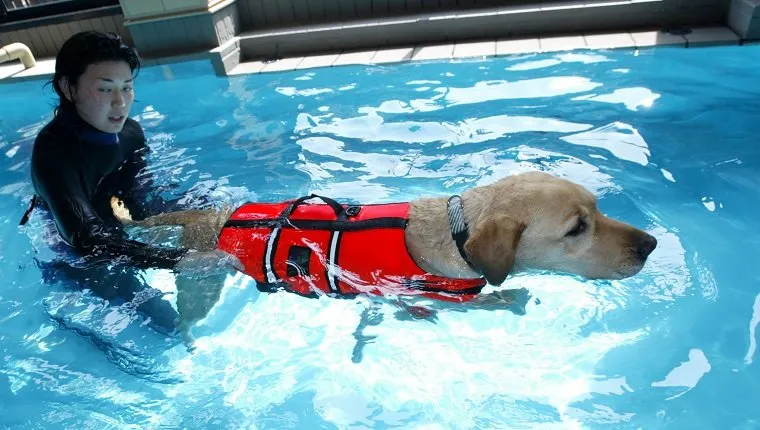The term “autoimmune disease” covers a broad variety of disorders in dogs that affect the immune system. A dog’s immune system is a network of white blood cells, antibodies, and other defenses in the body that fight off infections and foreign substances, including bacteria and viruses. Canine autoimmune diseases cause the immune system to attack the body’s own cells and tissue.
An autoimmune disorder can be life-threatening to dogs depending on which organ or tissue the immune system rejects. There are many types of autoimmune diseases in dogs with various symptoms. Treatment depends on the kind of autoimmune disorder.
Here are some of the types of autoimmune diseases that affect dogs, the signs to watch out for, and the methods of treatment you might expect your vet to prescribe.
Types, Symptoms, And Treatments Of Immune Disease In Dogs

Systemic Lupus Erythematosus
Systemic lupus erythematosus (SLE) is a rare autoimmune disease that can be hereditary in dogs.
Certain breeds are more predisposed to the condition. These include:
- Afghan Hounds
- Beagles
- Collies
- German Shepherds
- Irish Setters
- Old English Sheepdogs
- Poodles
- Shetland Sheepdogs
Typically symptoms appear around age six, but can show up at any age, and often flare up or go into remission for periods of time. SLE can affect the skin, heart, lungs, kidneys, joints, blood, and nervous system as antibodies in the blood attack the body’s own cells and tissue. Usually more than one organ will be affected.
Symptoms depend on where the disease is localized, but can include the following:
- Lameness or pain in one or more joints and muscles
- Increased drinking or urination
- Ulcers on the face or feet
- Lesions, scars, ulceration, or crusting on the skin
- Alopecia (hair loss)
- Loss of pigment in the nose
- Fever
- Anemia
- Thyroid problems
- Swollen lymph nodes
- Kidney infections
- Spleen, liver, or kidney enlargement
The causes of SLE are unknown, but there is a hereditary component for some dogs, and exposure to ultraviolet light makes the condition worse. Hospitalization is necessary for severe cases until the condition can be managed.
At home, rest is advised for dogs with joint pain, and exposure to sunlight must be limited. Your vet may change your dog’s diet to be more kidney friendly. They may also prescribe immunosuppressive drugs or steroids to reduce inflammation.
Autoimmune Hemolytic Anemia
Autoimmune hemolytic anemia (AIHA) happens when the dog’s immune system attacks the body’s red blood cells. Red blood cells are responsible for bringing oxygen from the lungs to all tissue of the body. With AIHA, the red blood cells are destroyed or damaged faster than they can be replaced.
Symptoms include the following:
- Weakness or lethargy
- Weight loss or anorexia
- Increased heart rate and breathing
- Pale mucous membranes on the gums and eyes
- Fever
- Jaundice
- Discoloration of the eyes, gums, and skin
- Collapse, in severe cases
The causes of the disease are unknown, but it appears more frequently in middle-aged female dogs, and certain breeds like Cocker Spaniels and Poodles are more predisposed; although, any dog could develop AIHA.
Corticosteroids and immunosuppressive drugs may be prescribed to keep the condition under control.
In cases where drugs are not effective, the spleen may be removed. The spleen is responsible for destroying red blood cells that the body deems damaged or no longer useful. Dogs can live a healthy life without a spleen. Rarely, a blood transfusion may be used.
Immune-Mediated Thrombocytopenia

Immune-mediated thrombocytopenia (ITP) happens when the immune system attacks thrombocytes, the cells responsible for forming blood clots. Dogs with this condition will not likely experience a collapse or crisis like they may with AIHA, but it can be a serious condition if there’s any bleeding.
Here are some of the symptoms you may notice with ITP:
- Bruising
- Excessive bleeding after an injury or surgery
- Excessive bleeding during menstruation
- Blood in the urine or stool
Treatment for ITP in dogs is similar to treatment for AIHA. A vet may administer corticosteroids and immunosuppressive drugs. They may remove the spleen, as well.
A blood or plasma transfusion may also be helpful. In female dogs, an ovariohysterectomy may be performed to decrease the risk of uterine hemorrhaging.
Autoimmune Skin Diseases
Autoimmune diseases of the skin in dogs are rare and various. They can be difficult to diagnose, and each comes with its own set of symptoms.
Here are several types of autoimmune diseases of the skin and the signs you should look out for:
- Pemphigus comes in many forms, but commonly results in scaly skin, scabs, or pus-filled sores. Blisters that rupture quickly can also appear. In some forms, these symptoms can sometimes stay confined to the head and feet before spreading elsewhere. The most severe form is pemphigus vulgaris in which ulcers can appear at the mouth, anus, prepuce, nose, and vagina.
- Discoid lupus erythematosis is likely related to SLE, but only affects the face and nose. There may be loss of pigment, scaly skin, or scabby sores around the nose. Ultraviolet light makes nasal scarring worse. Dog sunscreen and shelter from sunlight are recommended.
- Vogt-Koyanagi-Harada-like syndrome is extremely rare and causes a loss of pigmentation along with eye disease. The nose, lips, eyelids, footpads, and anus turn from black to pink or white, and the eyes become severely infected. Treating it early can prevent blindness.
With skin autoimmune diseases, treatment usually involves the use of topical corticosteroids or low to medium doses of prednisone. Minor cases can require very little treatment, while more severe cases necessitate frequent vet visits with strict instructions for medication.
Immune-Mediated Polyarthritis
Immune-mediated polyarthritis can sometimes be seen with SLE or can exist on its own. It covers several specific diseases, but the symptoms in dogs are largely the same.
Symptoms include the following:
- High fever
- Joint pain or swelling
- Lameness that shifts from leg to leg
- Enlarged lymph nodes
In about half of the cases of immune-mediated polyarthritis, dogs go into remission after being treated with corticosteroids. Cytoxan or Imuran are drugs that may be given in the rest of cases, and are followed up with steroids.
Usually this condition is quite manageable with treatment, and the outlook for affected dogs is good.
Other Types Of Treatment For Immune Diseases In Dogs

In addition to medication, some might find a holistic approach helpful when treating autoimmune disorders in dogs. You should discuss these additional treatments with your vet to make sure they’re safe for your dog and won’t interfere with other medications.
These treatments might include the following:
- Switching to a diet of unprocessed food that hasn’t been treated with chemicals or preservatives.
- Massage by a trained professional who’s aware of your dog’s condition.
- Supplements. These may include ingredients like turmeric, a known anti-inflammatory, or Omega-3, vitamin E, Selenium, and Vitamin C. A probiotic may also be helpful.
- Removal of stress from your dog’s environment, including anything that may cause anxiety.
- Hydrotherapy, which is especially helpful for dogs who may have arthritis symptoms.
- Acupuncture from a trained and licensed practitioner.
Has your dog ever suffered from an autoimmune disease? What treatment did you find helpful? Let us know in the comments below!









